“Mzungu, mzungu!”
“How are you?”
“I am fine.”
“Goodbye mzungu!”
This is the soundtrack to our lives in East Africa.
Being white here is roughly like being a leprechaun. We are
the rarest, most intriguing creatures that the people here, especially the
children, have ever seen, and as such, warrant being stared at and called to as
we go anywhere. Driving to the grocery store is like being Miss America on a
float at the Macy’s Thanksgiving Day Parade-people stop everything they are
doing to stare at us in fascinated confusion. Trying to film the music video
last month in the Rift Valley was made much more entertaining and difficult by
the fact that, as I was trying to hold the camera steady and get a usable shot,
twenty kids were standing behind me, open-mouthed at my sheer existence, daring
each other to run up to me and pull out pieces of my perplexingly straight, impossibly
light-colored hair for closer examination. In Kenya we even went on a safari
where we came across a bus full of school children on a field trip. In the
field behind us were zebras, buffalo, rhinos, flamingos, and a host of other
amazing African wildlife, but instead of looking at the animals, the children
were all screaming at us and staring as if they had just spotted a rare,
extremely well camouflaged leopard, or possibly an extraterrestrial being fresh
from the mother ship. In short, we are a spectacle everywhere we go.
So, other than the fact that white people are very rare in
this part of the world, why are mzungus
so attractive to the people here? Why does everyone want to be our friend? Why
do cab drivers fight over which taxi we will take, and why do people bring us
to the front of the lines at doctor’s offices and food courts? Is it because
they are amazed by the almost glow-in-the-dark color of our skin or the fact
that we can turn bright red at the mere thought of the sun on the Equator? Is
it the way that our mosquito bites stand out so clearly in order to give us a
lovely polka dotted appearance? No. The unfortunate truth is that it’s usually
because people think that we have money.
For many people in East Africa, their only contact with mzungus is through what they see on
television or through stories they have heard of white westerners funding aid
projects in the area. While such efforts are well intentioned and are
accomplishing a lot of good, they are also leaving behind an impression of
astronomical western wealth and a mentality of dependency on outside resources,
motivations, and ways of doing things. Over time, we have come to represent
dollar signs, which not only makes us a target for theft, but also complicates
our relationships with churches and contacts who assume that we have a lot more
money that we actually have. When people see us, they see someone with the
resources and influence to make things happen for them. They look at us and
they see possibilities. The belief here is that if you want to start a ministry
or get anything done that requires money, you need a mzungu behind it. If you have a mzungu,
you can do anything. With this background, I want to tell you a story.
When we arrived in Uganda at the beginning of this month, we
sat down with our contact and his wife to hear about their lives and allow them
to cast the vision for their ministry and our role in it this month. Pastor
Diphus and his wife, Mabel, are amazingly kind people with three beautiful
children-Amen, Praise, and Adonai. They told us about their family, and Pastor
Diphus explained how they started the Celebrate Jesus Ministries Church and the
Goshenland Primary School that they run.
Some years ago, right after they got married, Diphus had a
dream that he was supposed to buy a certain piece of land and start a ministry
called Celebrate Jesus on that land. He told Mabel and she said that if God
gave her the same vision they would do it. After praying about it for awhile,
she saw the same thing, so they began making an effort to save money to buy the
land. Once they had enough money, they purchased the land, and the next step was
to establish partnerships to start the ministry. They met with pastors from the
area and finally got an appointment with an organization that helps new
ministries get started.
In the meeting, the men from the organization tried to
change the name of the proposed ministry, but Diphus explained that God named
it Celebrate Jesus Ministries so they would not be changing it. The men did not
seem enthused about partnering with him and began to ask more questions about
Diphus’s vision and plans to fund the ministry. “Do you have someone to financially back your ministry? Do you have a mzungu?” they asked him. “You can’t do anything without a mzungu to support your ministry. You
must have a mzungu behind this or we
won’t approve it because there is another man trying to start a ministry who
wants our help, and he has a mzungu
supporting him,” they explained. “No,”
Diphus told them, “I do not have a mzungu. I have God. God is my mzungu, and he will provide for my
ministry because he asked me to start it.”
He walked out of that meeting without a partnership, but God
has been faithful, and years later Celebrate Jesus Ministries and the
Goshenland Primary School are both thriving on the land that Diphus and Mabel
bought. They have day students and students who board at the school, and the
church sends out more people into the ministry than it has in its seats on
Sundays. Each month they have four types of services, each run by a different
part of the church: pastor’s Sunday, youth Sunday, women’s Sunday, men’s
Sunday, and when there is a fifth Sunday the children lead the service. The
church trains leaders and sends them out, empowered to do God’s work all over
Uganda. And they did it all without the support of a mzungu. They trusted God enough to ignore the traditional way of
doing things here. Instead of relying on a white person from a far off country
to provide for their needs, they trusted that God would be faithful to complete
the work he started in them, and their faith is being rewarded. And what about
the man who had the support of the mzungu
who the organization decided to partner with instead of Diphus? His mzungu deserted him, and his ministry
never got off the ground. Lesson-white people, just like all people, will
disappoint you, but God will never fail.
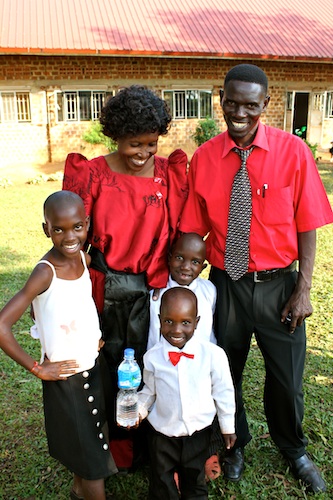
Mabel, Diphus, Amen, Praise, and Adonai
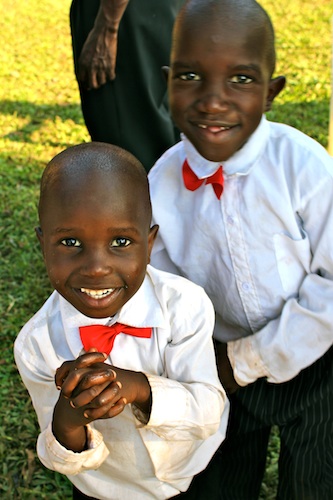
Adonai and Praise
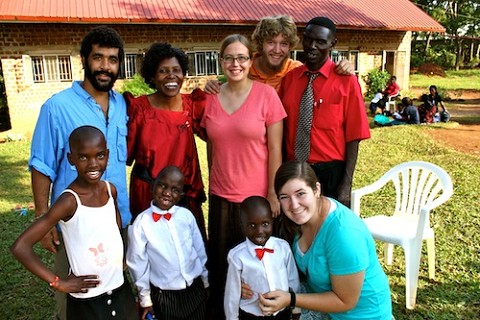
Some of our team with the family
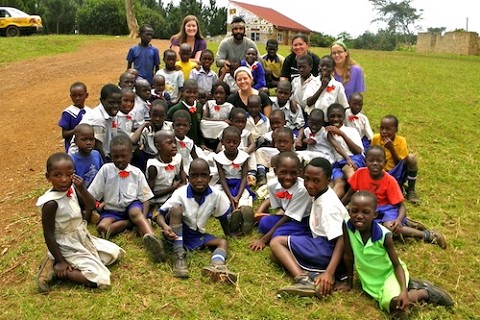
Some of our team with some of the school children
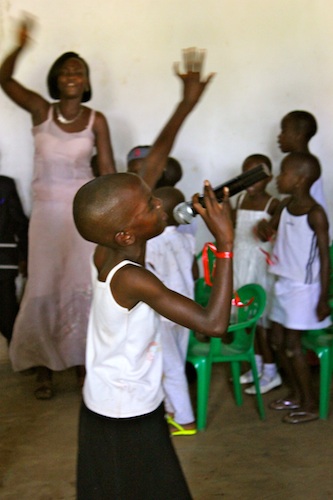
Amen singing in church
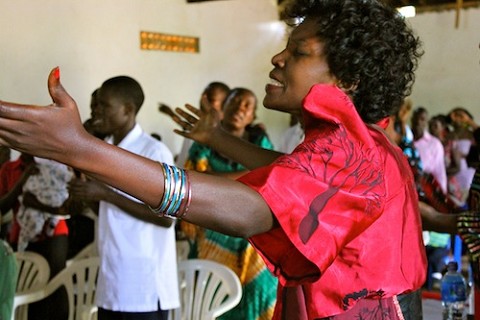
Mabel singing in church








